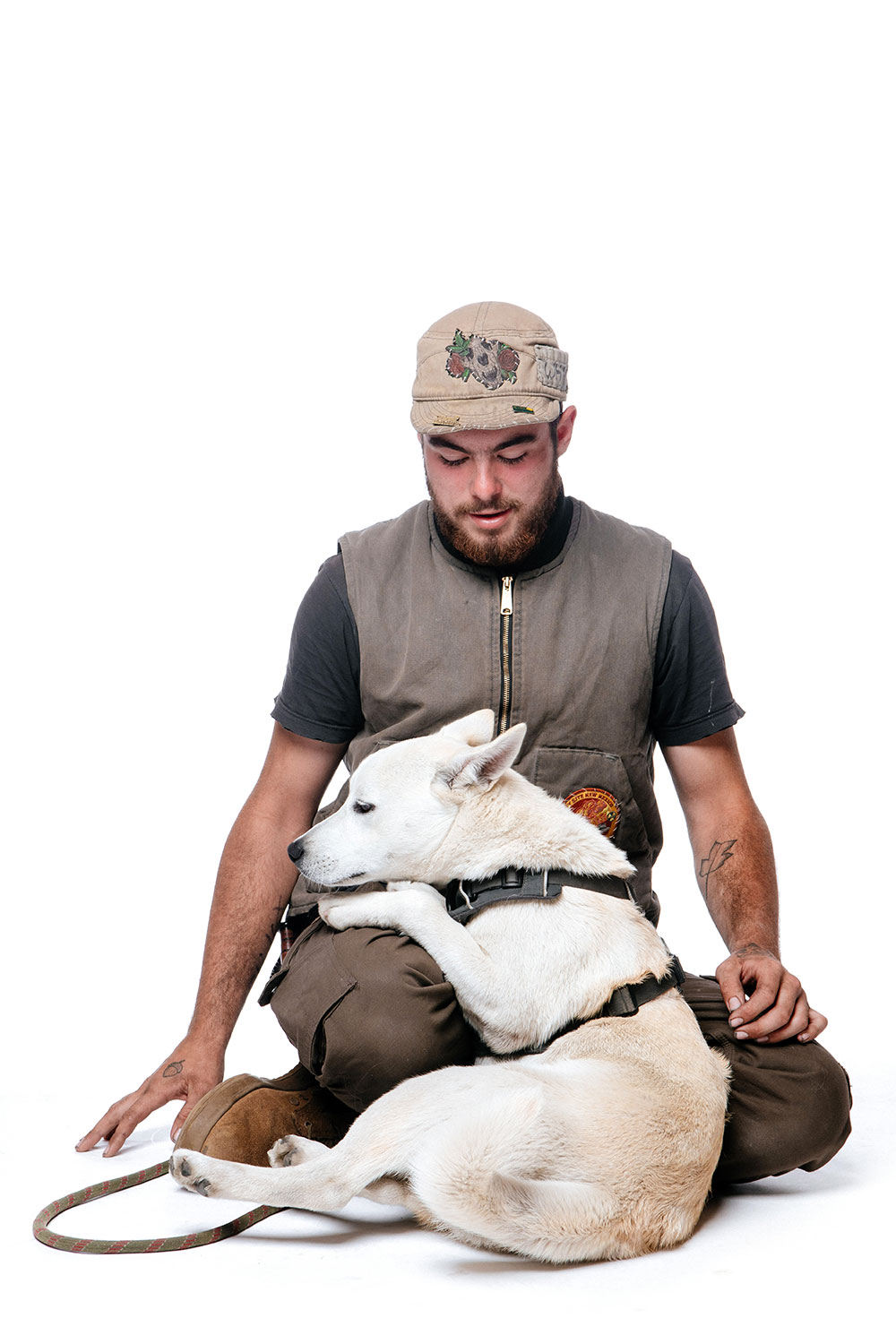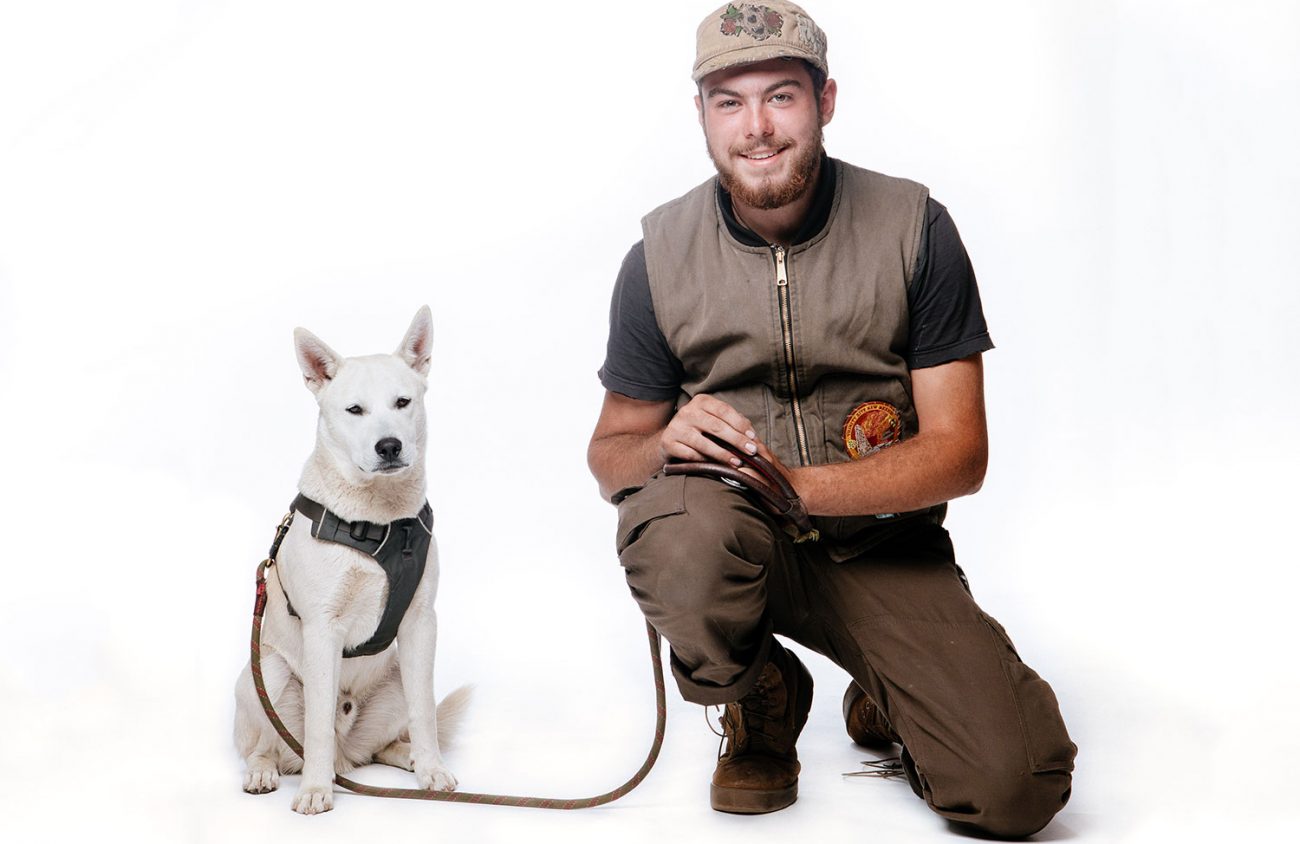Stop saying homeless people should not have dogs.
For people experiencing homelessness, a dog can play a paramount role in their lives.
Walking through the downtown area of Eugene is a young man in his early to mid 20s. He wears a large pack. A crop of messy, thick brown hair frames a friendly face. His eyes are a soft honey — bright, yet you can clearly tell they are covering something darker. He is dressed simply in a ragged T-shirt and jeans when he sits down near a tree in a shady area along the side of the Hult Center to share his story. His name is, simply, Teague.
Teague is an unhoused young man who has no idea where he will wake up tomorrow, or any day for that matter. That level of uncertainty — not knowing what local establishment is going to allow him to clean himself up, where he will be able to use the bathroom, how he will eat today or where he will get much needed rest — is stressful and terrifying at times.
But one thing brings Teague comfort in his unpredictable world — one thing that he knows for sure. Teague knows that no matter where he wakes up tomorrow, Leonard Doogle will be there.
Leonard is so named because “oogles have doogles,” Teague says. (“Oogle” is an urban slang term for a panhandler.) Leonard, Leo for short, is Teague’s faithful furry companion. Leo is an inquisitive white fluffball who is incredibly well-behaved for his age of six months.
Teague has been on the streets for a year and a half since he left his home state of Vermont. While he did not get deep into the details that led to his wandering, he did mention he left an area that has been riddled by the heroin epidemic.
“It’s depressing to think about what is going on there,” he says. Teague has recently arrived in Eugene, having been here for a few weeks, and is adjusting to this new landscape.
“Human beings can withstand a week without water, two weeks without food, many years of homelessness, but not loneliness,” Brazilian novelist Paul Coelho writes in his book Eleven Minutes. “It is the worst of all tortures, the worst of all sufferings”
Lonely is exactly how Teague felt after his first year navigating homelessness. He found himself in Alabama, in a dark place, without a reason to keep going on. He was in pain, experiencing a madness he could not push away.
Teague did not know how he would keep going. Then he happened upon an ad for free puppies. On a whim he responded.
That’s when Teague’s life changed.
Leo, a husky-red heeler mix, had a rough start in life. Leo came from a meth den, Teague says, and several of his siblings succumbed to parvovirus. When Leo was handed to him through a car window in a parking lot, he instantly knew this little white puppy needed him just as much as Teague needed the dog.
“Leo is the only reason I am alive,” Teague says. “He is why I get up in the morning. He is why I no longer get in fights, why I am now off drugs. I just can’t risk getting into trouble and losing him.”
He has changed his whole outlook on life, and makes smarter choices for Leo, he says.
In the last six months, Leo and Teague have traveled through 42 states with no money or support. Their preferred method of transportation is trainhopping, and Teague says Leo probably has more “train cred” than most of the street kids in Eugene.
The two sometimes go weeks without contact with other humans, so Leo is the only companion Teague has to stave away the ever-near pit of loneliness. The conversations never feel one sided, as Leo is expressive, responding in his own way with little sounds, ear flops, paws and even a smile from time to time.
“Leo always eats first, always,” Teague says.
Caring for his furry best friend is top priority. The spitfire of a puppy looks healthy, maybe even a little chunky. Teague relies on churches, food banks and pet stores to ensure that Leo is eating well.
He often picks up samples at “fancy” pet stores, which allow Leo some extra fine dining from time to time. Teague says that it is also not unusual for good Samaritans to bring bags of dog food as well. “Dogs get taken care of by everyone,” he says.
Enlarge

Photo by Todd Cooper
That human connection goes further than just food. Before Leo, Teague often felt invisible. People would walk by and turn their heads away.
“It was easy for passers-by to pretend I was not there. To turn their nose up and exclude me from their perfect bubble of existence,” he says.
Leo changed all of that.
Having a dog has mitigated the stigma Teague felt in the past. People walk by and cannot resist the friendly white puppy, whose tail curls up over his back. They stop and ask to pet Leo, opening Teague up to conversations and connections he was previously missing.
People take the time to notice Teague and Leo, and he feels a part of greater humanity for the first time in a long time.
Without Leo, Teague says, he would have no reason to continue on. The responsibility of pet ownership keeps him motivated, connected with reality and alive. They need each other.
Also in the Pets Issue:
Art Animals A studio menagerie provides therapy
Running Rough Meet the Oregon Ruff Runners, your dog’s best friends
BarkCon Dog people unite as Eugene gears up for the first Willamette Valley Canine Convention
Pets Photo Contest Winners
